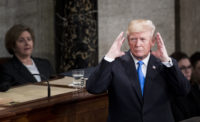Congressional committees are laying the groundwork for a new multiyear surface transportation bill, or maybe a more wide-ranging infrastructure package. Senate and House panels have held initial hearings, but the window for action this year is narrow, perhaps a matter of months.

In the Senate, Environment and Public Works Committee Chairman John Barrasso (R-Wyo.), is working on the highway portion of a long-term highway-transit reauthorization. Barrasso aims to get a new measure in place before the current law, the Fixing America’s Surface Transportation, or FAST, Act, expires on Sept. 30, 2020.
Speaking at the American Association of State Highway and Transportation Officials (AASHTO) winter meeting in Washington, D.C., on Feb. 27, Barrasso said he had asked committee members to let him know by about mid-March what provisions they want to see in a new transportation bill. After that, he will seek input from other senators.
John Davis, Wyoming Dept. of Transportation manager of federal relations and policy, says Barrasso and the committee’s ranking Democrat, Tom Carper (Del.), are “certainly pushing the wagon train ahead” to produce a bill.
Barrasso says he wants the bill to take care of rural states’ needs as well urban ones, reduce regulation and retain the current practice of distributing funds to states by formula.
Barrasso also said, “The time has come to make significant investments in our roads and bridges and to keep the Highway Trust Fund solvent.” He didn’t offer a proposal for finding the additional resources the trust fund needs.

In the House, Transportation and Infrastructure Committee Chairman Peter DeFazio (D-Ore.) is pursuing a two-track approach, a committee aide says. The staffer says a highway-transit bill probably would come first and a bigger infrastructure package would follow.
DeFazio told the AASHTO gathering he wants the transportation bill to have a strong federal component. Noting that federal motor-fuels taxes haven’t been raised since 1993, he said, “It’s time for the federal government to step up, step back in and become a better partner.”
The House committee’s top Republican, Sam Graves (Mo.), says DeFazio wants the panel to approve a bill by May. It’s unclear whether it will be highways-transit or a comprehensive package. Graves says DeFazio has set a “fairly aggressive” timetable. “But it is doable—very, very doable.”
Still, Graves says lawmakers face “a fairly short timeline.” He says, “If we don’t have something done at least out of the House of Representatives by August, I don’t believe it’s going to happen.” The reason: the run-up to the 2020 elections.
DeFazio says, “The key is going to be revenues.” He proposed indexing federal fuels taxes for inflation and using that revenue to back $500 billion in bonds. He also mentions “a national pilot program” for a vehicle-miles tax. Graves is pushing a mileage fee. Finding revenue will be up to the Senate Finance and House Ways and Means committees. Maryland DOT Secretary Pete Rahn says, “Where I end up is, where they come up with the funds, I don’t care, as long as the funds are directed to where we need investment.”
Utah DOT Executive Director Carlos Braceras sees an opportunity in 2019 to produce a transportation or infrastructure bill. “We have about six months,” Braceras says. “And if we can’t do anything significant in six months, I think we’re going to be on standby until we get through the presidential election.” That probably would mean a FAST Act extension, covering several months at least.




Post a comment to this article
Report Abusive Comment